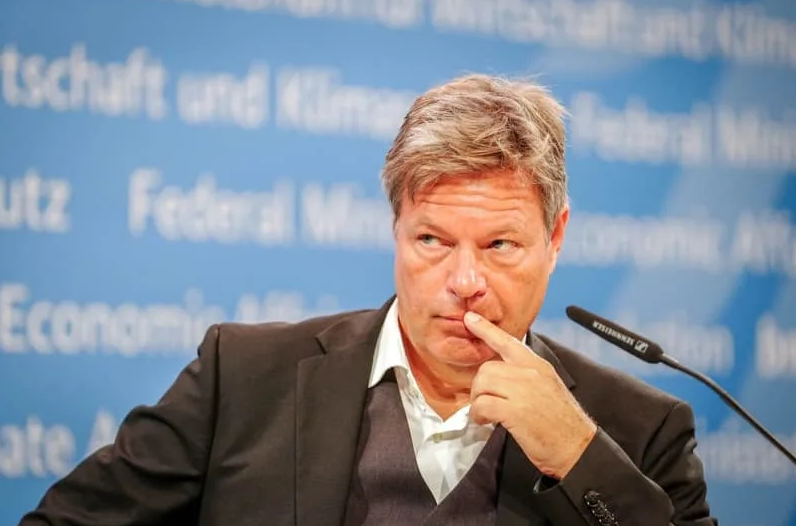The German government has cut its forecasts and expects Europe's largest economy to shrink for a second straight year as hopes of a consumption-driven recovery have faded, local media reported.
The German Economy Ministry expects the German economy to shrink by 0.2% this year, instead of its previous estimate of 0.3% growth, leading daily Süddeutsche Zeitung reported on October 6.
“Instead of accelerating, the economy continues to be characterized by a general reluctance among consumers to spend,” the German newspaper said.

German Vice Chancellor and Minister of Economy Robert Habeck. Photo: Yahoo!Finance
Although the German economy has been struggling with recession for two consecutive years, not all is grey. The federal government forecasts a more optimistic outlook for the coming years, the Süddeutsche Zeitung newspaper reports.
The German Economy Ministry will officially announce its latest forecast for Europe's No. 1 economy on October 9, expecting growth of 1.1% in 2025, up from 1% in the previous forecast. And by 2026, the economy is expected to grow by 1.6%.
Slow recovery
Germany is the only major economy to shrink in 2023 as the Western European powerhouse struggles with the impact of an industrial slowdown, fewer export orders and soaring energy prices due to the Russia-Ukraine conflict.
Hopes that cooling inflation and the European Central Bank's (ECB) first interest rate cut would fuel a recovery in Germany this year have looked increasingly remote in recent months, as domestic and foreign demand remains weak.
Germany's leading economic institutes have also recently downgraded their forecasts, and now predict the EU's largest economy will stagnate or shrink by 0.1% this year.
They were even more cautious in their forecasts for the next two years, cutting their growth estimate for 2025 to 0.8% from 1.4% previously, and predicting growth of just 1.3% in 2026.
Adding to Germany's economic woes, the country is also facing challenges such as growing competition from China, a shortage of skilled workers and issues related to the transition from fossil fuels to renewable energy.
Growth Plan
German Vice Chancellor and Economy Minister Robert Habeck admitted to the DPA news agency on October 7 that the country's economy is performing poorly.
But Mr Habeck told the Süddeutsche Zeitung newspaper that the "growth initiative" proposed by the coalition government would play a key role in the economic recovery.
Measures planned by Berlin include tax cuts, energy price cuts for industry, streamlining bureaucracy, incentives for older people to stay in work and more attractive conditions for skilled foreign workers.
“The German economy could grow significantly stronger in the next two years if the measures are fully implemented,” Mr Habeck was quoted as saying. The proposal still needs to be approved by the German parliament.
Minh Duc (According to DW, Fortune)
Source: https://www.nguoiduatin.vn/nen-kinh-te-dau-tau-chau-au-vat-lon-voi-cuoc-suy-thoai-tiep-theo-204241008182733683.htm


![[Photo] Close-up of Tang Long Bridge, Thu Duc City after repairing rutting](https://vphoto.vietnam.vn/thumb/1200x675/vietnam/resource/IMAGE/2025/5/19/086736d9d11f43198f5bd8d78df9bd41)
![[Photo] General Secretary To Lam attends the conference to review 10 years of implementing Directive No. 05 of the Politburo and evaluate the results of implementing Regulation No. 09 of the Central Public Security Party Committee.](https://vphoto.vietnam.vn/thumb/1200x675/vietnam/resource/IMAGE/2025/5/19/2f44458c655a4403acd7929dbbfa5039)
![[Photo] Panorama of the Opening Ceremony of the 43rd Nhan Dan Newspaper National Table Tennis Championship](https://vphoto.vietnam.vn/thumb/1200x675/vietnam/resource/IMAGE/2025/5/19/5e22950340b941309280448198bcf1d9)

![[Photo] President Luong Cuong presents the 40-year Party membership badge to Chief of the Office of the President Le Khanh Hai](https://vphoto.vietnam.vn/thumb/1200x675/vietnam/resource/IMAGE/2025/5/19/a22bc55dd7bf4a2ab7e3958d32282c15)


























![[Photo] Prime Minister Pham Minh Chinh inspects the progress of the National Exhibition and Fair Center project](https://vphoto.vietnam.vn/thumb/1200x675/vietnam/resource/IMAGE/2025/5/19/35189ac8807140d897ad2b7d2583fbae)




























































![[VIDEO] - Enhancing the value of Quang Nam OCOP products through trade connections](https://vphoto.vietnam.vn/thumb/402x226/vietnam/resource/IMAGE/2025/5/17/5be5b5fff1f14914986fad159097a677)



Comment (0)